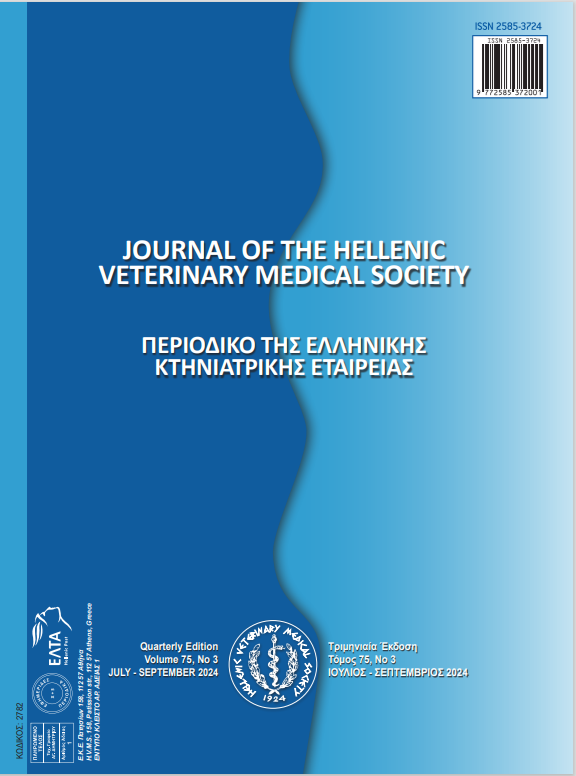Comparison of Fatty Acid Profile and Proximate Composition of Three Native Trout Species: Health Benefits and Risk Assessments Associated with Their Consumption

Περίληψη
Evaluating fish's nutrient content could provide essential guidance for fish consumption and the protection of human health. This study investigated the biochemical composition and fatty acid profiles (FA) of three native trout species: Salmo rizeensis, Salmo ardahanensis, and Salmo coruhensis. This is the first study to characterize FA content and lipid quality indices of S. rizeensis, Salmo ardahanensis, and S. coruhensis. The highest crude protein and crude fat were found in S. ardahanensis and S. rizeensis, respectively. Although there was no significant difference (p < 0.05) among trout species on crude protein, the crude fat content of S. rizeensis was significantly higher (p < 0.05) than the other species. The FA compositions of trout species ranged from 29.22% to 40.12% saturated FAs (SFA), 27.57% to 37.67% monounsaturated FAs (MUFA), and 26.54% to 28.41% polyunsaturated FAs (PUFA). The most dominant FAs were palmitic acid (C16:0) among SFAs, oleic acid (C18:1n9c) among MUFAs, and linoleic acid (C18:2n6c), eicosapentaenoic acid (EPA; C20:5n3) and docosahexaenoic acid (DHA; C22:6n3) among PUFAs. These species were found to be rich sources of EPA+DHA in the range of 10.49-15.58%. The highest fish lipid quality index (FLQ) and EPA+DHA content were found in S. ardahanensis, while the highest h/H value was in S. coruhensis. The atherogenic index, thrombogenic index, and ∑n-3/n-6 ratio of all species were within the limit range reported by international organizations. These results showed that all trout species used in this study could be considered as a beneficial and balanced food source for human consumption in terms of rich protein content, FA ratio, and lipid quality indices in future fish farming.
Λεπτομέρειες άρθρου
- Πώς να δημιουργήσετε Αναφορές
-
Karsli, B., Çağlak, E., & Kaya , C. (2024). Comparison of Fatty Acid Profile and Proximate Composition of Three Native Trout Species: Health Benefits and Risk Assessments Associated with Their Consumption. Περιοδικό της Ελληνικής Κτηνιατρικής Εταιρείας, 75(3), 7655–7668. https://doi.org/10.12681/jhvms.33319
- Τεύχος
- Τόμ. 75 Αρ. 3 (2024)
- Ενότητα
- Research Articles

Αυτή η εργασία είναι αδειοδοτημένη υπό το CC Αναφορά Δημιουργού – Μη Εμπορική Χρήση 4.0.
Οι συγγραφείς των άρθρων που δημοσιεύονται στο περιοδικό διατηρούν τα δικαιώματα πνευματικής ιδιοκτησίας επί των άρθρων τους, δίνοντας στο περιοδικό το δικαίωμα της πρώτης δημοσίευσης.
Άρθρα που δημοσιεύονται στο περιοδικό διατίθενται με άδεια Creative Commons 4.0 Non Commercial και σύμφωνα με την άδεια μπορούν να χρησιμοποιούνται ελεύθερα, με αναφορά στο/στη συγγραφέα και στην πρώτη δημοσίευση για μη κερδοσκοπικούς σκοπούς.
Οι συγγραφείς μπορούν να καταθέσουν το άρθρο σε ιδρυματικό ή άλλο αποθετήριο ή/και να το δημοσιεύσουν σε άλλη έκδοση, με υποχρεωτική την αναφορά πρώτης δημοσίευσης στο J Hellenic Vet Med Soc
Οι συγγραφείς ενθαρρύνονται να καταθέσουν σε αποθετήριο ή να δημοσιεύσουν την εργασία τους στο διαδίκτυο πριν ή κατά τη διαδικασία υποβολής και αξιολόγησής της.


